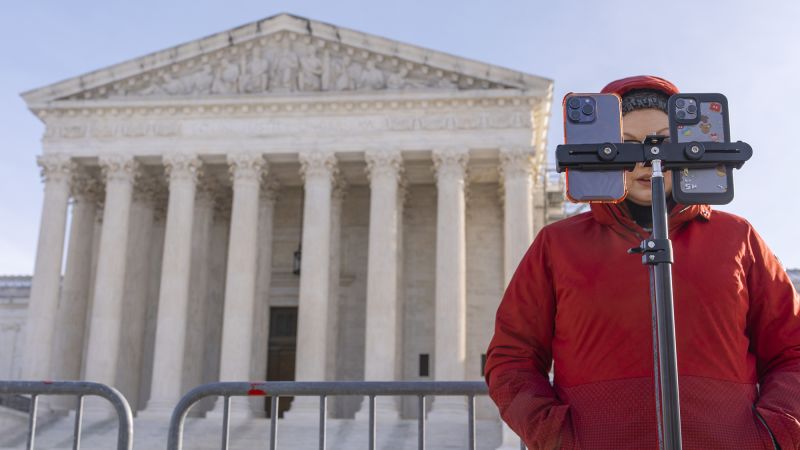Instructions

In a pivotal decision that could reshape the social media landscape, the Supreme Court has green-lit a controversial ban on TikTok, clearing the way for potential restrictions as early as this weekend. The landmark ruling dismisses TikTok's passionate defense that the proposed ban would infringe upon users' First Amendment rights to free speech and expression.
The court's decision marks a significant moment for the wildly popular video-sharing platform, which has become a cultural phenomenon among millions of users, particularly younger generations. TikTok's parent company, ByteDance, had vigorously fought against the potential ban, arguing that it would not only harm their business but also silence the voices of countless content creators.
While the specifics of the implementation remain unclear, the Supreme Court's ruling suggests that government concerns about potential national security risks associated with the app have taken precedence over free speech arguments. This development could have far-reaching implications for how social media platforms are regulated and perceived in the United States.
As the weekend approaches, TikTok users and creators are left in a state of uncertainty, wondering about the potential impact of this judicial decision on their digital communities and creative outlets.
Supreme Court's Landmark Decision: TikTok's Digital Fate Hangs in the Balance
In an unprecedented legal showdown that could reshape the landscape of social media and digital communication, the United States Supreme Court has delivered a pivotal ruling with far-reaching implications for one of the world's most popular social platforms, potentially altering the digital ecosystem for millions of users.
Digital Freedom vs. National Security: The Battle for TikTok's Survival
The Constitutional Crossroads
The Supreme Court's recent decision represents a critical juncture in the ongoing legal and geopolitical tensions surrounding TikTok. By allowing the controversial ban to proceed, the court has signaled its willingness to prioritize national security concerns over potential First Amendment arguments. This ruling emerges from complex deliberations about digital privacy, technological sovereignty, and the intricate relationship between social media platforms and governmental oversight.
Legal experts have long debated the nuanced implications of such a ban, recognizing that the decision transcends a simple technological dispute. The court's ruling suggests a profound examination of how foreign-owned digital platforms might pose potential risks to national security infrastructure, while simultaneously challenging fundamental principles of digital expression and communication.
Technological Sovereignty and Global Digital Dynamics
The TikTok ban represents more than a mere regulatory action; it symbolizes a broader geopolitical struggle in the digital realm. With ByteDance, TikTok's parent company, rooted in China, the United States government has consistently expressed concerns about potential data privacy and national security vulnerabilities. The Supreme Court's decision underscores the growing tension between technological globalization and national security imperatives.
Technological policy analysts argue that this ruling could set a significant precedent for how governments might approach digital platforms with potential foreign influence. The decision signals a robust stance on protecting digital sovereignty, potentially influencing future international technology regulations and cross-border digital interactions.
User Rights and Digital Expression
The potential TikTok ban raises profound questions about digital rights and the extent of governmental authority in regulating social media platforms. By supporting the ban, the Supreme Court has effectively challenged the platform's argument that the prohibition infringes upon users' First Amendment rights to free expression.
Millions of content creators, particularly younger demographics who have built substantial online communities, now face unprecedented uncertainty. The ruling could fundamentally alter their digital communication strategies, forcing a reevaluation of how individuals and communities engage with social media platforms.
Economic and Cultural Implications
Beyond legal and security considerations, the TikTok ban carries significant economic and cultural ramifications. The platform has become a critical marketing channel for businesses, a creative outlet for artists, and a global communication network connecting millions of users across diverse demographics.
The potential shutdown threatens not just a social media platform, but an entire ecosystem of digital creativity, entrepreneurship, and cross-cultural communication. Small businesses, influencers, and content creators who have built their brands and livelihoods on TikTok now confront a landscape of unprecedented disruption.
Future of Digital Platforms and Regulatory Landscape
This Supreme Court decision is likely to catalyze broader discussions about digital platform regulation, data privacy, and the delicate balance between technological innovation and national security. It represents a watershed moment in understanding how governmental bodies might approach increasingly complex digital challenges.
The ruling invites critical reflections on the evolving nature of digital sovereignty, the boundaries of technological freedom, and the complex interplay between global technological platforms and national regulatory frameworks. As digital technologies continue to transform global communication, this decision may well be remembered as a pivotal moment in defining the future of digital interaction.

